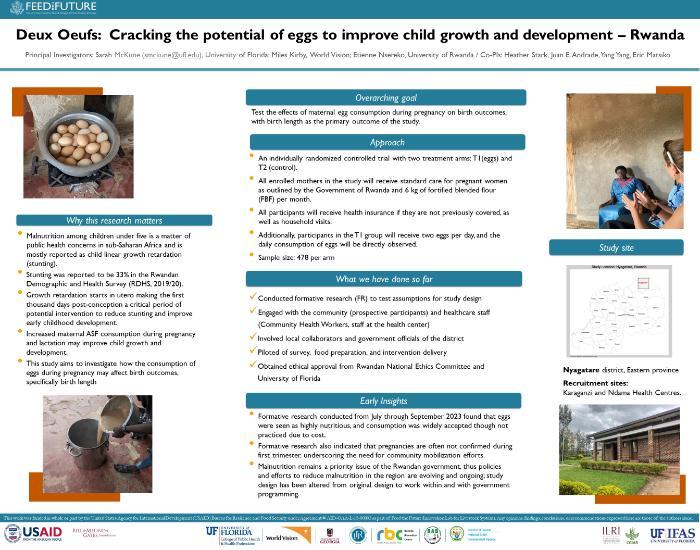Cracking the Potential of Eggs to Improve Child Growth and Development in Rwanda
- Research Project Location: Rwanda
- Timeframe: October 2022 - September 2025 (Terminated in February 2025)
- Funding: USAID
Introduction
Inadequate and less diverse diets during critical life stages, including pregnancy, lactation, and infancy, contribute to malnutrition of children, particularly in low- and middle-income countries (LMICs). The first thousand days post-conception have been identified as a critical period of potential intervention within which to reduce stunting and improve early childhood development. Previous studies have repeatedly demonstrated that child growth stunting often begins in utero and is directly related to maternal nutrition. In LMIC, typical diets are less diverse than those in high-income countries and often lack animal-source foods (ASF), which are rich sources of bioavailable macro and micronutrients but are limited by barriers specific to LMIC.
Recent research indicates that upon introducing complementary foods, the consumption of eggs by infants and young children can improve nutritional outcomes. Given the alignment of nutrient demand during pregnancy and lactation, nutrient composition and bioavailability in ASF, and increased evidence of the benefits of ASF in children's diets increased maternal ASF consumption during
pregnancy and lactation may improve child growth and development.
The overarching aim of this project was to test the effects of maternal egg consumption during pregnancy on birth length. The project will also investigate the relationship between maternal egg consumption and other birth outcomes.
Project Objectives
- To improve prenatal and postnatal maternal health indicators
- To improve child’s growth outcomes at birth and 6 months through improved maternal nutrition
Research Approach
Using a randomized controlled trial, this study will investigate the effect of maternal egg consumption during pregnancy on birth outcomes. All enrolled mothers in the study will receive the standard of care for pregnant women, as outlined by the Government of Rwanda (GoR); health insurance, if they are not previously covered; and engagement in additional clinical assessment during pregnancy by the research team. Any enrolled mother not receiving 6 kg of Shisha Kibondo (SK), a government-distributed nutrient-dense plant-based food, per month, per GoR standard of care for mothers who are undernourished, will receive 6 kg/month of a fortified flour (CSB+) that is nutritionally comparable to SK during pregnancy. Participants will include mother-child dyads: pregnant women will be recruited, enrolled, and followed with their children through the age of six months.
In addition to those items outlined above, mothers in treatment arm one (T1) will receive two eggs per day, and in treatment arm two (T2), they will be asked to consume their typical diet. Dietary supplements will be initiated upon enrollment (9-14 weeks gestation) and continue through childbirth.
Principal Investigators (PIs) and lead institution

- Sarah McKune, University of Florida*
- Miles Kirby, World Vision
- Etienne Nsereko, University of Rwanda
*Lead Institution
Co-Principal Investigator
- Eric Matsiko, University of Rwanda
- Heather Stark, University of Florida
- Juan E. Andrade Laborde, University of Florida
- Yang Yang, University of Georgia
Resources




